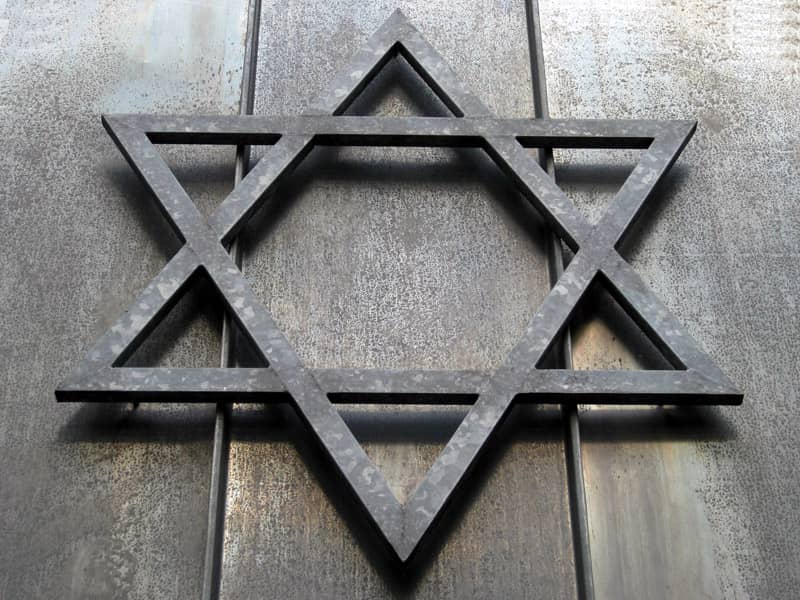Too many Jews are far from personal prayer, far from calling in a serious way on the name of God. How wonderful it would be to be in such constant close communion with the divine that speaking to God was as natural as speaking to a friend. I remember talking to a rabbi who told me that personal prayer came very easily to her. She said, "I just talk to God, like Tevye in the 'Fiddler on the Roof.'" That indeed was the teaching of the Hasidic master Rebbe Nachman of Bratzlav, who advised his followers to pray every day, walking in the woods, calling out to God. He also advised his followers to pray in their familiar language, to talk to God in the language of the heart, in their case Yiddish, in ours, English. Too many people associate prayer with the special formal language: the "holy tongue," or Hebrew. They feel they can't talk to God unless they repeat the formal language of the prayer book, and because they aren't really familiar with it, they just forget the idea altogether.
And indeed there is a strain in Jewish thought that says prayer, real prayer, has to be in Hebrew. There's even the sense given that it is better to recite synagogue prayers in Hebrew, even if you don't understand what you are saying, than to recite those prayers in English. One result of this approach is that two generations of perfectly intelligent Jewish kids have learned to read Hebrew in the same sense that a parrot speaks English. That is, they don't really read, they merely sound out the letters--letters combined into longer syllables that are completely empty of meaning. When they study for their bar mitzvahs or bat mitzvahs, they are given tapes to memorize the empty sounds, which they learn to sing. They don't have a clue as to what these words mean.
I once read that piano lessons were the most futile expenditure in America, because millions of people took lessons and only a very few ever learned to play. Hebrew must be number two, because countless hours have been spent in after-school Hebrew lessons, in bar and bat mitzvah lessons, and the result is not really reading but "transliteration." We would never tolerate that level of education in secular subjects. Suppose a child came home from high school French and said, "I can pronounce all the words, but I don't know what any of them mean." Yet that is the situation too often with Hebrew education.
There is no special time to pray in this manner, but dawn and dusk, the hours when we shift from night to day and day to night, are particularly good times for taking stock. As for the place, Rebbe Nachman recommended taking a walk in the woods, far from town. For contemporary urban dwellers, that might be possible in a nearby park. Another practice for adding personal prayer to your schedule is based on the natural rhythms of waking up and going to sleep. At waking, it's traditional to say, "I thank you living and eternal God for restoring my soul to me out of sheer kindness." But if that's too much to say, a simple "Thanks God for this day" will do. Starting the day with a grateful attitude seems a terrific way to orient oneself to whatever is ahead.
In the evening, one says the Shema, the affirmation that God is one. But before saying it, it's good to review the day, taking note of all those who have done us well, and forgiving in our hearts those who have done us harm. Only then can we affirm the unity of God with real fullness.
What does it mean to cultivate a simple practice of personal prayer on a daily basis? Small changes, perhaps, at first, but over time such a practice infuses everything we do with a deeper meaning, including all the normative practices of Judaism, such as synagogue prayer. There's something else--a deeper sense of connection to everyone around you, and an elevation of the soul. I have read that when the Indian teacher and leader Mohandas Gandhi was assassinated, the last word that he uttered was the name of the Hindu God, Ram. This indicates to me that the thought of the divine, as he understood it, was never far from the consciousness of Gandhi, and that's a powerful example.
In the Jewish tradition, there's a similar ideal, that a person, as his dying words, should say the Shema, "Hear O Israel, the Lord our God, the Lord is One." To end one's life in such an affirmation seems deeply meaningful. But such words would never come to mind at the end if they had not been practiced all through one's life. I sometimes fear what the last word on my lips would be if I were surprised by death. I wonder if it would be a thoughtless exclamation, an excremental curse, or even a name I don't truly believe in. I'd hate to go out on the wrong note.

